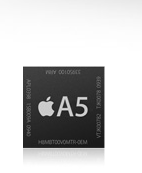The case for Intel making Apple's mobile chips: A Wintel of the post-PC era

Intel is reportedly in the running to make Apple's mobile chips---the A4 and A5---in a foundry deal. Here's why such a move would make sense.
As noted by the EE Times, Intel is also pursuing Apple's foundry business. Apple is already planning to work with Taiwan Semiconductor Manufacturing.

Richard sets up the importance to Intel succinctly:
Intel has no market share in the next wave of computing. Smartphones and tablets are where innovation and excitement are being created. Moreover, we do not believe Intel can overcome Apple and Google's first mover advantage in terms of attracting the attention of application developers. In order to afford to be a process technology leader Intel needs to aggregate volume as Moore gets more expensive. The solution is for Intel to become Apple's foundry, and we believe the company is pursuing this strategy.
So why does this Intel-Apple deal make sense?
Trust and volume. Apple and Intel already work together on the Mac. They also collaborate on technologies like Thunderbolt. Meanwhile, Intel needs volume if it's going to be a mobile chip player and has the heft to give Apple a good price. Apple and its army of iPhones and iPads bring volume.
Nailing Samsung. It has been clear for months that the Apple-Samsung relationship is tense. That's why Apple is moving to TSMC in the first place. However, Intel may give Apple a better deal and more of a manufacturing advantage in the long run---especially as the chip giant pushes 22-nanometer technology.
Intel needs to master low power. Richard said:
Intel has missed the transition to a post-PC era. There are several reasons for this. First, historically the company's design methodology has been driven by high performance microprocessors and not the low power SOCs required for smartphones, tablets and other mobile devices. In our view, this is a significant issue as Intel needs to develop a rapidly expanding array of IP and learn how to integrate it quickly in a low power envelope. Second, the company continues to support its PC and x86 legacy creating significant inertia. This makes it more difficult to transition to the post-PC era as its products are crippled carrying this legacy.
22-nanometer processes benefit both Intel and Apple. Intel can't be beat on manufacturing, argues Richard. If Intel's 22-nanometer delivers a huge performance gain, Apple benefits by working with the chip giant as a foundry.
Intel and Apple working together on chips is a win-win. Richard writes:
The combination of Apple's growing demand and market share in smart phones and tablets gives Intel a position in these markets and drives the logic volume Intel needs to stay ahead in manufacturing. Intel's manufacturing lead gives Apple an additional competitive advantage in these markets and distances it from Asian competitors that are knocking off its products. A partnership between the two companies would drive dominance in tablets similar to Wintel's dominance in PCs. Furthermore, it would also serve to weaken Samsung who is a significant competitive threat to both companies.